Harvard Report Recommends That Fewer High School Students Pursue a College Prep Curriculum
A century ago, W.E.B. Du Bois and Booker T. Washington were engaged in a great debate on the proper path that African Americans should follow regarding education. Washington advocated vocational training while Du Bois believed that blacks should receive a more enlightened education that included the classic disciplines of American higher education.
It seems that the debate is still going on. A new report from the Harvard Graduate School of Education concludes that not all high school students should be taking a college preparatory curriculum. Steering unprepared high school students into college prep mathematics and science courses, according to the report, is adding to the large high school dropout rate.
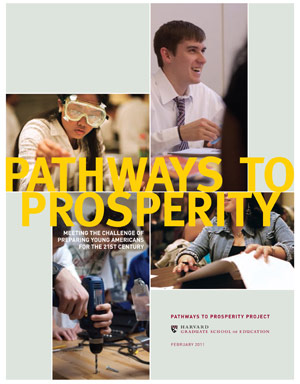
The Harvard report, Pathways to Prosperity: Meeting the Challenge of Preparing Young Americans for the 21st Century, concludes that “America is still failing to prepare millions of its young people to lead successful lives as adults. Our national strategy for education and youth development has been too narrowly focused on an academic, classroom-based approach.” The study recommends that America place “more emphasis on career counseling and high-quality career education, as well as apprenticeship programs and community colleges.”
While race is dealt with only peripherally in this report, it seems that a disproportionate share of the students who will be recommended for vocational training will be blacks or other minorities. It is likely that guidance counselors and teachers will tell many black students that they simply “are not college material” and should focus on vocational pursuits. It seems likely that many late-blooming or underperforming black students will be steered away from a course of study that may very well serve them better in life.
For interested readers, the Harvard report can be downloaded by clicking here.
The Soaring Number of African-American Advanced Placement Test Takers
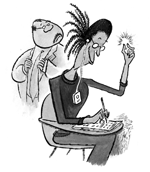 More than 73,000 African-American members of the 2010 high school graduating class took an Advanced Placement test during their high school career. This is 16.5 percent of all black high school graduates in 2010. More than 73,000 African-American members of the 2010 high school graduating class took an Advanced Placement test during their high school career. This is 16.5 percent of all black high school graduates in 2010.
Just five years earlier in 2005, there were only 38,000 black members of the high school graduating class who had taken an AP examination. Only slightly more than 10 percent of the black graduating seniors in 2005 had taken an AP test.
Because many students take multiple AP examinations over the course of their high school careers, the total number of AP tests taken by black members of the high school class of 2010 was 173,016. This was 6.9 percent of all AP exams taken by the members of the 2010 graduating class.
Of the black seniors who took AP examinations during their high school careers, 63 percent were women. English language and English literature were the two most popular AP examinations taken by black seniors. U.S. history ranked third, followed by U.S. government and politics and psychology.
Tempers Are Boiling Over at Medgar Evers College
 At Medgar Evers College in Brooklyn, New York, relations remain tense between many members of the faculty and the administration of President William L. Pollard. Dr. Pollard became president in 2009. Previously he served five years as president of the University of the District of Columbia, a tenure that was also punctuated with controversy. At Medgar Evers College in Brooklyn, New York, relations remain tense between many members of the faculty and the administration of President William L. Pollard. Dr. Pollard became president in 2009. Previously he served five years as president of the University of the District of Columbia, a tenure that was also punctuated with controversy.
Last summer, many in the Medgar Evers college community were outraged when ATM machines belonging to black-owned Carver Federal Savings were replaced by Citibank ATMs. Then in December, the Center for NuLeadership on Urban Issues was evicted from its campus offices. The administration ended a center program that would have brought 300 nonviolent offenders to campus for training rather than sending them to jail. The center’s leaders have filed a lawsuit against the college.
When 10 faculty members were not rehired late last year, several received notices of their termination hand-delivered by security guards. Some of the notices were delivered to faculty while they were teaching in the classroom.
In December, 59 of the 66 permanent faculty members attending a meeting of the faculty senate approved a vote of no confidence in the administration.
Blacks make up 86 percent of the 7,000-member student body at Medgar Evers College.

SOUTHERN METHODIST UNIVERSITY

Lecturer and Digital Newsroom Manager
(Position Number 049851)
The Division of Journalism invites nominations and applications for a lecturer and digital newsroom manager. This is a non-tenure-track position that will teach basic audio and video in the division’s undergraduate program. The position is also responsible for directing maintenance of the broadcast studio and computer installations in the Journalism Complex. Applicants should have a minimum of five years’ experience in professional broadcast or video operations with a strong background in all facets of video production. Successful teaching at the university level will be helpful. The successful applicant will have a three-year contract with the possibility of renewal. The position begins August 2011.
Minimum qualifications: A bachelor’s degree in journalism or communication and five years’ professional media experience.
Preferred qualifications: A master’s degree in journalism or communication and 10 years’ professional experience in a major media market. Management experience is a plus.
Send letter of application highlighting the candidate’s qualifications, complete curriculum vitae, and three letters of recommendation to: Mark Vamos, William J. O’Neil Chair in Business Journalism, Southern Methodist University, P.O. Box 750113, Dallas, TX, 75275-0113, or as email attachments to mvamos@smu.edu.
We encourage digital applications. Emailed files should be saved to smallest size. All digital material/files/media must be fully functioning on both PC and Mac platforms.
To ensure full consideration for the position, the application must be received by March 30, 2011. The committee will continue to accept applications until the position is filled. The committee will notify applicants of its employment decisions after the position is filled. Hiring is contingent upon the satisfactory completion of a background check.
The Division of Journalism is a program committed to teaching the media professionals of the 21st Century. We are situated in the top media market in the Southwest, and we emphasize teaching and scholarship in convergent media. Our digital facilities are state of the art. Our students excel in developing critical thinking skills with an uncompromising commitment to fairness, ethics and professionalism.
Our Web site is http://www.smu.edu/Meadows/AreasOfStudy/Journalism.aspx. Also see the division’s convergence news Web site, www.smudailymustang.com.
SMU is an inclusive and intellectually vibrant community of teachers and scholars that values diverse research and creative agendas. SMU offers excellent benefits including full same-sex domestic partner benefits. Explore Virtual SMU at http://www.smu.edu.
SMU has a beautifully shaded campus of Georgian Revival-inspired architecture and is situated in the heart of Dallas. The Dallas/Fort Worth Metroplex, a culturally rich arts and global business center, is home to many universities, arts organizations and Fortune 500 & 100 corporations. http://www.dallaschamber.org.
SMU will not discriminate on the basis of race, color, religion, national origin, sex, age, disability or veteran status. SMU is also committed to the principle of nondiscrimination on the basis of sexual orientation.

In Memoriam
Lorenzo Long (1958-2011)
 The Rev. Lorenzo Long, pastor of the Central Baptist Church in West Baltimore and longtime media technologist at Bowie State University, died last month from complications of surgery at a hospital in Columbia, Maryland. The Rev. Lorenzo Long, pastor of the Central Baptist Church in West Baltimore and longtime media technologist at Bowie State University, died last month from complications of surgery at a hospital in Columbia, Maryland.
Dr. Long also taught photography at Bowie State and was the university’s official staff photographer until he resigned in 2007 to devote his full time to his pastoral duties.
Long was a 1983 graduate of Bowie State and earned a master’s degree and a doctorate in divinity from Family Bible Institute, College, and Seminary in Baltimore.
Elton Ward Long (1943-2011)
 Elton Ward Long, a longtime professor of criminal justice at Sacramento State University in California, died last month from complications resulting from a series of strokes. He was 67 years old. Elton Ward Long, a longtime professor of criminal justice at Sacramento State University in California, died last month from complications resulting from a series of strokes. He was 67 years old.
A native of Oak Park, California, Long earned bachelor’s and law degrees at Howard University in the nation’s capital. He joined the faculty at Sacramento State University in 1972.
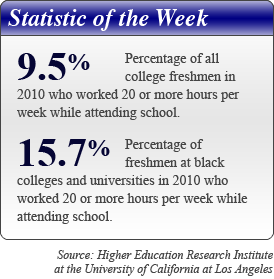
Honors and Awards
 • Mary Cameron, associate director of the office of human resources at the University of Minnesota at Duluth, received the Drum Major for Peace Award from the Duluth chapter of the NAACP. • Mary Cameron, associate director of the office of human resources at the University of Minnesota at Duluth, received the Drum Major for Peace Award from the Duluth chapter of the NAACP.
Cameron holds bachelor’s and master’s degrees from the University of Minnesota at Duluth and a second master’s degree from Syracuse University. She is currently pursuing a doctorate in organizational leadership and policy development.
 • Temika Michael Simmons, assistant professor of psychology at Delta State University in Cleveland, Mississippi, received the 2011 Distinguished Dissertation Award from the Council of Historically Black Graduate Schools. She recently completed her doctoral studies in education at Howard University. • Temika Michael Simmons, assistant professor of psychology at Delta State University in Cleveland, Mississippi, received the 2011 Distinguished Dissertation Award from the Council of Historically Black Graduate Schools. She recently completed her doctoral studies in education at Howard University.
• The University of Alabama’s Multicultural Journalism Program received the 2011 Diversity Award from the Journalism Education Association.
 • Emma A. Faulk, assistant professor of business/marketing education at Alabama State University in Montgomery, received the Outstanding Postsecondary Business Educator Award from the Alabama Business Education Association. • Emma A. Faulk, assistant professor of business/marketing education at Alabama State University in Montgomery, received the Outstanding Postsecondary Business Educator Award from the Alabama Business Education Association.
 • Dolores Finger Wright, an associate professor of social work at Delaware State University in Dover, received the Sit-In Hero’s Award from the International Civil Rights Center and Museum. As an undergraduate student at Bennett College in 1960, she helped organize the Greensboro lunch counter sit-ins. • Dolores Finger Wright, an associate professor of social work at Delaware State University in Dover, received the Sit-In Hero’s Award from the International Civil Rights Center and Museum. As an undergraduate student at Bennett College in 1960, she helped organize the Greensboro lunch counter sit-ins.
Dr. Wright graduated from Bennett College and went on to earn a master of social work degree from Rutgers University and a Ph.D. in social work from Howard University.
 • Zelia Wiley, assistant dean for diversity at the College of Agriculture at Kansas State University, received the Commerce Bank Presidential Faculty and Staff Award for Distinguished Service to Historically Underrepresented Students. • Zelia Wiley, assistant dean for diversity at the College of Agriculture at Kansas State University, received the Commerce Bank Presidential Faculty and Staff Award for Distinguished Service to Historically Underrepresented Students.
Grants and Gifts
• North Carolina A&T State University, the historically black educational institution in Greensboro, received a five-year, $1 million grant from the U.S. Department of Education to establish a doctoral program in rehabilitation counseling.
• Historically black Howard University received a $50,000 grant from the Avon Foundation to increase awareness of the importance of early detection in saving lives of breast cancer patients.
• Historically black Alabama A&M University received a four-year, $483,768 grant from the U.S. Department of Homeland Security for programs to increase the number of minority students in scientific fields relating to homeland security.
|
Health Disparities Among Different Groups of American Blacks
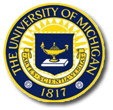 A new report by scientists at the University of Michigan finds that there are wide-ranging health disparities among different groups of black Americans. The study, published in the Journal of Health Care for the Poor and Underserved, found that blacks who were born in the Caribbean were healthier than African Americans generally. The study also found that blacks of Caribbean descent but who were born in the United States were not as healthy as Caribbean-born blacks or African Americans generally. A new report by scientists at the University of Michigan finds that there are wide-ranging health disparities among different groups of black Americans. The study, published in the Journal of Health Care for the Poor and Underserved, found that blacks who were born in the Caribbean were healthier than African Americans generally. The study also found that blacks of Caribbean descent but who were born in the United States were not as healthy as Caribbean-born blacks or African Americans generally.
Blacks in the 45-59 age group reported being less healthy than younger or older blacks.
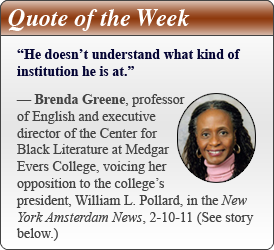
George Washington Carver Papers Donated to Clemson University
 In 1923 George Washington Carver, the distinguished agricultural chemist who developed hundreds of soybean and peanut products, was the first African American invited to speak at the then all-white Clemson University in South Carolina. A decade later, Clemson chemistry instructor Wallace Friday took two Clemson students to visit Carver at his laboratory on the campus of Tuskegee University. In 1923 George Washington Carver, the distinguished agricultural chemist who developed hundreds of soybean and peanut products, was the first African American invited to speak at the then all-white Clemson University in South Carolina. A decade later, Clemson chemistry instructor Wallace Friday took two Clemson students to visit Carver at his laboratory on the campus of Tuskegee University.
One of the students, Kelley E. Traynham, saved photographs and letters he received from Carver after visiting Tuskegee. These documents were recently donated to the Clemson special collections library by Traynham’s widow.
Traynham graduated from Clemson with a degree in agriculture chemistry. He later became an executive for the textile firm J.P. Stevens.
Explaining the High Black Student Graduation Rate at the University of Virginia
Since JBHE began tracking graduation rates of black students at the nation’s leading colleges and universities nearly two decades ago, the University of Virginia has always ranked at the top of the list for state-operated educational institutions.
 The university prides itself on this achievement and works hard to maintain its superior performance in graduating black students. The Office of African-American Affairs, led by Dean Maurice Apprey, begins the process before black students even take their first class. He meets with incoming students and their parents, stressing the importance of academic achievement and offering advice on curriculum. Black students are made aware of academic services that are available to them should they have any difficulty in making the transition to college. Since 1995 the university has offered a faculty-student mentoring service. There is also a Peer Advisor Program that offers tutoring to students who need help with their classwork. The university prides itself on this achievement and works hard to maintain its superior performance in graduating black students. The Office of African-American Affairs, led by Dean Maurice Apprey, begins the process before black students even take their first class. He meets with incoming students and their parents, stressing the importance of academic achievement and offering advice on curriculum. Black students are made aware of academic services that are available to them should they have any difficulty in making the transition to college. Since 1995 the university has offered a faculty-student mentoring service. There is also a Peer Advisor Program that offers tutoring to students who need help with their classwork.
The emphasis on strong academics has paid off not only in maintaining a high black student graduation rate. The university reports that from 2005 to 2010 the percentage of African-American students with a grade point average of 3.0 or higher for their first semester has increased by 14 percent.
Center for Equal Opportunity Charges Black Students Are Getting Undue Admissions Preferences at State Universities in Ohio
 The Center for Equal Opportunity (CEO), a right-wing think tank in Falls Church, Virginia, has published a new report that claims Ohio State University and Miami University of Ohio give unwarranted admissions preferences to blacks and other minorities. The Center for Equal Opportunity (CEO), a right-wing think tank in Falls Church, Virginia, has published a new report that claims Ohio State University and Miami University of Ohio give unwarranted admissions preferences to blacks and other minorities.
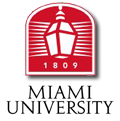 The data shows that white applicants are admitted to both universities at a higher rate than black applicants. But when applicants with similar standardized test scores and high school grade point averages are compared, the CEO data shows that blacks were up to 10 times as likely to be admitted as whites at Miami University and were up to eight times as likely to be admitted to Ohio State. The data shows that white applicants are admitted to both universities at a higher rate than black applicants. But when applicants with similar standardized test scores and high school grade point averages are compared, the CEO data shows that blacks were up to 10 times as likely to be admitted as whites at Miami University and were up to eight times as likely to be admitted to Ohio State.
The study showed that black students admitted to these two universities on average had combined SAT scores that were between 110 and 160 points below the mean scores of admitted white students.
For interested readers, the CEO report can be downloaded at the organization’s Web site.
Scholarship Program Looks to Increase the Number of Black and Other Minority Public School Teachers
In the United States today more than 40 percent of all public school students are members of minority groups. But only 16.7 percent of all teachers are minorities, and the percentage is decreasing.
 To address the shortage of black and other minority teachers, in 1992 the Rockefeller Brothers Fund established the Aspiring Teachers of Color program. In 2010 the Woodrow Wilson National Fellowship Foundation took over the administration of the program. Since 1992 the Aspiring Teachers of Color program has issued scholarships to 375 students who aspired to be teachers. Recipients receive $30,000 for graduate school. They sign a pledge to teach in an urban or rural public school for three years. The program reports that 60 percent of its fellows are still teaching five years after completing graduate school. This compares to the national average of 33 percent who are still teaching after five years. To address the shortage of black and other minority teachers, in 1992 the Rockefeller Brothers Fund established the Aspiring Teachers of Color program. In 2010 the Woodrow Wilson National Fellowship Foundation took over the administration of the program. Since 1992 the Aspiring Teachers of Color program has issued scholarships to 375 students who aspired to be teachers. Recipients receive $30,000 for graduate school. They sign a pledge to teach in an urban or rural public school for three years. The program reports that 60 percent of its fellows are still teaching five years after completing graduate school. This compares to the national average of 33 percent who are still teaching after five years.
To be eligible for the fellowships, students must be African American, Hispanic, Asian, or Native American, have at least a 3.0 grade point average in college, and be accepted at a participating graduate school.
A new class of 25 fellows has been chosen for the Aspiring Teachers of Color program. Three of the new fellows are from Ivy League schools and two are from historically black colleges.
Recent Books That May Be of Interest to African-American Scholars
 The JBHE Weekly Bulletin regularly publishes a list of new books that may be of interest to our readers. Here are the latest selections. The JBHE Weekly Bulletin regularly publishes a list of new books that may be of interest to our readers. Here are the latest selections.
• A World Among These Islands: Essays on Literature, Race, and National Identity in Antillean America by Roberto A. Marquez (University of Massachusetts Press)
• Black Fire: One Hundred Years of African American Pentecostalism by Estrelda Y. Alexander (IVP Academic Press)
• Black Nationalism in the United States: From Malcolm X to Barack Obama by James Lance Taylor (Lynne Rienner Publishers)
• Forsaking All Others: A True Story of Interracial Sex and Revenge in the 1880s South by Charles F. Robinson (University of Tennessee Press)
• Health Psychology: An Interdisciplinary Approach by Deborah Fish Ragin (Pearson)
• Mixing Races: From Scientific Racism to Modern Evolutionary Ideas by Paul Lawrence Farber (Johns Hopkins University Press)
• Places for the Spirit: Traditional African American Gardens by Vaughn Sills (Trinity University Press)
• Race Appeal: How Candidates Invoke Race in U.S. Political Campaigns by Charlton D. Mcllwain and Stephen M. Caliendo (Temple University Press)
• Remembering the Power of Words: The Life of an Oregon Activist, Legislator, and Community Leader by Avel Louise Gordly with Patricia A. Schechter (Oregon State University Press)
• Sorting Letters, Sorting Lives: Delivering Diversity in the United States Postal Service by Linda B. Benbow (Lexington Books)
• The Papers of Clarence Mitchell Jr., Volume III: NAACP Labor Secretary and Director of the NAACP Washington Bureau, 1946-1950 edited by Denton L. Watson (Ohio University Press)
• The Presidential Recordings, Lyndon B. Johnson, Volumes 7-8: Mississippi Burning and the Passage of the Civil Rights Act, June 1, 1964-July 4, 1964 edited by Timothy Naftali et al. (W.W. Norton)
• The White Negress: Literature, Minstrelsy, and the Black-Jewish Imaginary by Lori Harrison-Kahan (Rutgers University Press)
• Thug Life: Race, Gender, and the Meaning of Hip-Hop by Michael P. Jeffries (University of Chicago Press)
Appointments, Promotions, and Resignations
 • Stephen A. Martin was appointed senior director of internal auditing and risk management at Tuskegee University in Alabama. He was a revenue agent for the Internal Revenue Service. • Stephen A. Martin was appointed senior director of internal auditing and risk management at Tuskegee University in Alabama. He was a revenue agent for the Internal Revenue Service.
Martin holds a bachelor’s degree in Latin and an MBA from Tulane University.
 • Reed V. Tuckson was appointed to the board of trustees of Howard University in Washington, D.C. Dr. Tuckson is executive vice president and chief of medical affairs for the UnitedHealth Group in Minnetonka, Minnesota. • Reed V. Tuckson was appointed to the board of trustees of Howard University in Washington, D.C. Dr. Tuckson is executive vice president and chief of medical affairs for the UnitedHealth Group in Minnetonka, Minnesota.
Dr. Tuckson is a graduate of Howard University and the Georgetown University School of Medicine.
 • Rodney P. McClendon was named vice president for administration at Texas A&M University. He was senior vice president for operations at the University of North Texas. • Rodney P. McClendon was named vice president for administration at Texas A&M University. He was senior vice president for operations at the University of North Texas.
Dr. McClendon is a graduate of Morehouse College and the Emory University School of Law. He holds a Ph.D. from Texas A&M University.
 • Al Lavan has been appointed development officer at Delaware State University. He was the school’s head football coach from 2004 to 2010. Lavan is a graduate of Colorado State University. • Al Lavan has been appointed development officer at Delaware State University. He was the school’s head football coach from 2004 to 2010. Lavan is a graduate of Colorado State University.
 • Keyana Scales is the new director of undergraduate admissions at North Carolina A&T State University in Greensboro. She was the associate director of undergraduate admissions at North Carolina State University in Raleigh. • Keyana Scales is the new director of undergraduate admissions at North Carolina A&T State University in Greensboro. She was the associate director of undergraduate admissions at North Carolina State University in Raleigh.
Scales holds bachelor’s and master’s degrees from North Carolina State University.
 • Earlier this week David G. Carter Sr. stepped down as chancellor of the Connecticut State University System. Carter, who has served as chancellor for five years, had planned to retire after the academic year but left earlier due to health concerns. • Earlier this week David G. Carter Sr. stepped down as chancellor of the Connecticut State University System. Carter, who has served as chancellor for five years, had planned to retire after the academic year but left earlier due to health concerns.
Dr. Carter is a graduate of historically black Central State University in Wilberforce, Ohio. He holds a master’s degree from Miami University of Ohio and a Ph.D. from Ohio State University.
 • Brian Johnson, assistant vice president for academic affairs at Austin Peay State University in Clarksville, Tennessee, was named a Maxine Smith Fellow by the Tennessee Board of Regents. Under the fellowship, Johnson will spend half his time conducting research with the Tennessee Higher Education Commission in Nashville. • Brian Johnson, assistant vice president for academic affairs at Austin Peay State University in Clarksville, Tennessee, was named a Maxine Smith Fellow by the Tennessee Board of Regents. Under the fellowship, Johnson will spend half his time conducting research with the Tennessee Higher Education Commission in Nashville.
Dr. Johnson is a graduate of Johnson C. Smith University in Charlotte. He holds a master’s degree from the University of Wisconsin and a Ph.D. in English from the University of Southern California.
 • Trudie Kibbe Reed, president of Bethune-Cookman University in Daytona Beach, Florida, was elected secretary of the National Association of Independent Colleges and Universities. • Trudie Kibbe Reed, president of Bethune-Cookman University in Daytona Beach, Florida, was elected secretary of the National Association of Independent Colleges and Universities.
Dr. Reed earned bachelor’s and master’s degree from the University of Texas. She earned a second master’s degree and an educational doctorate from Columbia University.
 • Ellis B. Beteck was named dean of library services at the University of Maryland Eastern Shore. He was the interim director of the Louis Stokes Health Sciences Library at Howard University. • Ellis B. Beteck was named dean of library services at the University of Maryland Eastern Shore. He was the interim director of the Louis Stokes Health Sciences Library at Howard University.
Dr. Beteck, a native of Cameroon, is a graduate of the University of Calabar in Nigeria. He earned a master’s degree in public administration at Georgia College and a master’s degree in library science and a Ph.D. in international affairs and development from Clark Atlanta University.
|
 .
.